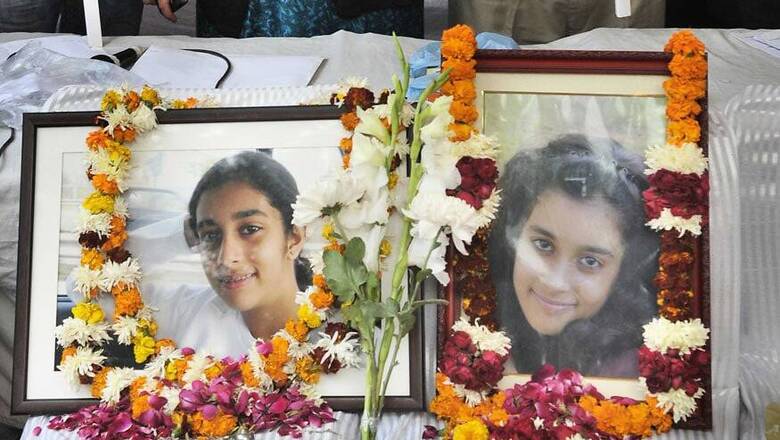
views
New Delhi: With Allahabad High Court acquitting Rajesh and Nupur Talwar in the Aarushi murder case, the HC has observed that the Talwar couple needs to be given benefit of doubt and chain of evidence could not be established against the dentist couple.
The verdict is primarily based upon one central principle of law — the burden of proof cannot be on accused.
The CBI court had in its 2013 judgment held the Talwar couple guilty of killing their 14-year-old daughter Aarushi Talwar after noting that the Evidence Act provisions had transferred the onus on the parents to explain how the teenager was murdered.
The trial court relied upon Sections 106 and 114 in the Evidence Act to state that since the Talwars were the only people in the house when Aarushi and their domestic help Hemraj were killed, they had to furnish satisfactory explanations to discharge their burden of proof.
Under Section 114, a court is entitled to "presumption of certain facts" based on certain reasonable human conduct.
This provision was resorted to by the CBI court to hold that there could be a presumption against the parents that they would have been in the knowledge of what was happening inside the house when there were no signs of forced entry by a third person nor was such a case built up by the defence.
Section 106 of the Evidence Act says that when any fact is especially within the knowledge of any person, the burden of proving that fact is upon him.
A body of judgments by the Supreme Court must have influenced the Allahabad High Court judgment wherein the top court examined Sections 114 and Section 106 of the Evidence Act.
On Section 106, the Supreme Court in Mangu Singh vs Dharmendra, 2015, ruled clearly that Section 106 does not absolve the prosecution's burden under Section 101 to prove its case of guilt of the accused beyond reasonable doubt. It emphasised the thumb rule of criminal law that while defence only require to show probability, the onus of proving the case beyond reasonable doubt will always remain with the prosecution.
In State of Rajasthan vs Thakur Singh, 2005, the apex court had held that "the law, therefore, is quite well settled that the burden of proving the guilt of an accused is on the prosecution, but there may be certain facts pertaining to a crime that can be known only to the accused, or are virtually impossible for the prosecution to prove. These facts need to be explained by the accused and if he does not do so, then it is a strong circumstance pointing to his guilt based on those facts."
But this verdict also clarified that it was not for an accused to prove his innocence but the burden was only to the extent of explaining the "unusual situation".
In Shambhu Nath Mehra vs State of Ajmer, 1956, the Supreme Court dealt with the interpretation of Section 106 of the Evidence Act and held that the section is not intended to shift the burden of proof (in respect of a crime) on the accused but to take care of a situation where a fact is known only to the accused and it is well-nigh impossible or extremely difficult for the prosecution to prove that fact.
In Gian Chand vs State of Haryana, 2013, the apex court ruled that this provision “is not intended to relieve the prosecution of its burden to prove the guilt of the accused beyond reasonable doubt”.
The court said that the section would apply to cases where the prosecution has succeeded in proving facts from which a reasonable inference can be drawn regarding the existence of certain other facts, unless the accused by virtue of his special knowledge regarding such facts, failed to offer any explanation which might drive the court to draw a different inference.
"Section 106 of the Evidence Act is designed to meet certain exceptional cases, in which, it would be impossible for the prosecution to establish certain facts which are particularly within the knowledge of the accused," it held.
Therefore, the prospect of the dentist couple in the Aarushi Talwar murder case appears was hinging on the only fact — that the presumption in law of their guilt was so strong that it could relieve the prosecution from its duty of proving the guilt beyond reasonable doubt, and that Talwars failed to discharge their duty to explain.
In a case based on circumstantial evidence and without clear cut motive, one shred of doubt is capable of getting an acquittal in law and that's what Talwars' have achieved today in the court of law.




















Comments
0 comment